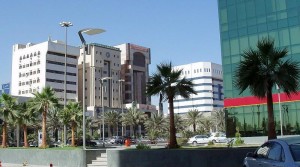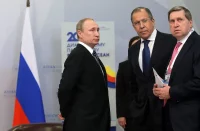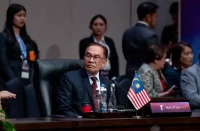ORIENTAL REVIEW republishes the full text of speech by the Director of the Russian Institute of Oriental Studies Professor Vitaly NAUMKIN, delivered on March 24, 2010 at the Janadriyah-2010 Festival held in Saudi Arabia.
Let me first of all express my whole-hearted gratitude to the organizers of our event for the honor of being a guest speaker at this highly respectable gathering.
Contemporary Islamic states have a significant role to play in the global economy, politics and culture. These three dimensions are closely intertwined. To illustrate, the energy resources supplied by these states on the world market can impact political processes and developments in such a way that will incur global repercussions. However, politics is linked to culture. It is just the cultural or civilizational dimension that ultimately defines the relationships of the Islamic world with other non-Islamic members of the international community.
 The only appropriate vision of the mainstream trend for developing these relations is contained in the valuable initiative of the Guardian of the Two Holy and Noble Sanctuaries, His Majesty King Abdullah bin al-Aziz. It is the road of dialogue between religion and cultures, their cooperation and cross-fertilization, respect and tolerance towards each other.
The only appropriate vision of the mainstream trend for developing these relations is contained in the valuable initiative of the Guardian of the Two Holy and Noble Sanctuaries, His Majesty King Abdullah bin al-Aziz. It is the road of dialogue between religion and cultures, their cooperation and cross-fertilization, respect and tolerance towards each other.
In a globalizing world, civilizations, cultures, people, states are exerting an increasing influence on each other, due to the ever more dynamic movement of capital, population and information (although, in reality, capital and information do enjoy a free flow of movement so far, but not people). In contrast to the last quarter of the XX century, when the overriding idea of globalization was primarily associated with the US domineering position, the situation now is very different. As Fareed Zakaria wrote in his book entitled Post-American World, following “the rise of the West”, in the XXI century there occurred “the rise of the Rest”.
Under globalization, all nations, states and civilizations have been actively interacting with each other, and gradually the rules of functioning applicable to economic and political systems have been drawn closer to each other, however, each civilization is justifiably proud of its own cultural values that constitute the foundation of its unique identity. Yet even in the economic field, institutional bodies and regulatory mechanisms developed by one civilization can appear to be more efficient globally, than those existing in another one. Thus, under conditions of the global financial downturn, Islamic banks demonstrated more stability and better efficiency than western lending institutions.
It is deplorable to admit that the relations between the Muslim world and the West have developed a negative trend over the past decade. The reason for that is well known. More than anything else, it lies in the occupation of the Arab Palestine and unjustifiable use of military force in other parts of the Islamic world. It is also in the actions perpetrated by terrorists, who arbitrarily arrogate to themselves the right to act, allegedly, on behalf of Islam. Obviously, there is a lot of hope that this situation can be remedied. And this hope is fueled, to a large extent, by the policies adopted by US President Barack Obama, who seeks to radically improve the relations with the Muslim world. His policies drastically differ from those pursued over a protracted period by neoconservatives, who had been in power before. A brief reminder that four years prior to the 9/11 tragedy, the list of Middle East regimes and organizations specified by Podhoretz, Bennett, Ledeen, Netanyahu and the Wall Street Journal, which reflects their views, as targets for destruction included Algeria, Libya, Egypt, Sudan, Lebanon, Syria, Iraq, Saudi Arabia, Iran, Hezbollah, Hamas, the Palestinian Authority, and so-called “militant Islam”.
The image of an “evil empire” was designed to offer counterbalance to the “good democratic empire” – the US. This image was prompted by the book titled The Clash of Civilizations by S. Huntington, in which the Islamic world is portrayed as an adversary of the Western world. “The crescent-shaped Islamic world has bloody borders….” the political scientist asserted menacingly, having borrowed the “clash” thesis from Bernard Lewis. The concept of the clash between civilizations has been a standing dish on the menu with the western political science in the 1990-s. In February, 2004, Charles Krauthammer triumphantly declared at an annual lunch at the American Enterprise Institute that Americans had created “the most powerful empire in world history.” America is, according to his assertions, not only a “unipolar power”, but also a “guardian of the international system”. And in the 2000-s, for some of the neocons, the frontrunner among the Islamic threat carriers was Saudi Arabia. On July, 2002, Richard Pearle invited Laurent Muraviec, former aide to Lyndon Larouche, to address a briefing at the then Richard Pearle-led Defense Policy Board, where he said that the US should submit an ultimatum to the House of Saud. “Either you prosecute and isolate those involved in the terror chain, including in the Saudi intelligence services, and stop any anti-US, anti-Israel predication, or else we will make an invasion, seize the oil fields and occupy Mecca.”
Fortunately for the US and Muslim world, the George W. Bush, Jr. administration did not heed Muraviec’s advice, and a crusade to conquer Mecca was never accomplished. But a segment in the US establishment has persevered in its efforts to shape the image of an enemy. Meanwhile, the annoyingly persistent desire to disseminate democracy in the Muslim world and to topple down regimes to achieve this end has discredited democratization slogans. Such a strategy has come to be regarded in the Islamic world as a cover-up for the striving to secure other geopolitical targets. As long as Palestine, Iraq and, to a lesser degree, Afghanistan continue to bear testimony to the engineering of “double standards” policies and the beating of the war drums, this policy will be perceived as a follow-up on the foregoing colonialism practices of the West, bringing back reminiscences of years of dependency and national humiliation to the native population of many countries.
Let me remind you how ironically the noted British journalist Robert Fisk wrote about Israeli claims to the biblical land: “We all have lands given to us by God or our forefathers. Didn’t Queen of England Maria Tudor die with the word “Calais” on her lips? May be Spain has a legitimate right to the Netherlands? Or Sweden to Norway and Denmark? Or Great Britain – the right to India? Or Muslims – as well as Jews – the right to Andalusia of the XV century? Any colonial power may come up with similar, absurd claims.” Even the Palestinian leaders themselves could not couch the idea in more precise terms than these.
In this context, I cannot but recall a story narrated by the Spanish writer Carlos Lencero, who lived in the Rif region of Morocco for a long time. The house he stayed at was owned by an old man, who initially fought against Franco during the Rif rebellion, and then, during the civil war in Spain, fought on Franco’s side against the Republicans (as many as 100,000 Moroccans fought on the side of Franco, 20,000 were killed). Lencero asked the old man if he saw any contradiction in such an abrupt change of loyalty? The old man raised his eyebrows in astonishment: “What is so strange about it? We always did the same thing: killed the Spanish.” It only remains for us to hope that the relations between the Islamic world and the Western world will not follow the same logic.
For the Western political discourse, a typical notion of the Islamic world as a community that, allegedly, repudiates democratic values has become a stereotyped conception. This stereotype has been often used as a justification for putting pressure to bear on those Muslim states, which are not aligned well with the US policies. However, as two of America’s leading scholars of Islam, John L. Esposito and John O. Voll, wrote, “Commitment to Westernization is no guarantee of democracy, nor is application of Islamic law a proof of an inherent authoritarianism in Islam.” As is well known, strenuous endeavors are made everywhere in the Islamic world to identify the best model of combining Islamic values with modern methods of governance, liberties and human rights. That is to say, there is no escaping the inevitability of transformation for any societies, including Muslim ones, yet, at the same time, they can be rightfully proud of the spiritual values and moral principles that were communicated to them about a thousand and a half years ago. They are also exerting and will be exerting their influence on the outside world, as the process of cross-fertilization of civilizations is a street with a two-way traffic.
One of the streets accommodating such traffic, moving with an ever increasing speed, is a “street of migrants”. The mere fact that the Muslim community has turned into a powerful social and political force in the West cannot fail to impact the system of governance and political institutions in the Western countries. Overall, Islam’s growing strength and importance lead to the emergence of new centers and escalating volatility in the global policymaking system. The new relations that have been formed among the major global policy actors, partially due to the above factor also, can be described with the employment of such a notion as polyarchy (translated from Greek as “pluralist rule”). The term was coined and introduced into scientific vocabulary about four hundred years ago by an American political scientist, Robert Dahl, to describe processes in developed democracies, and thereupon – some time later – was resurrected in relation to world politics by the US specialist in international affairs Seyom Brown. Brown noted that the term denotes exactly what is contained in its etymology, i.e. “political system that can be fairly chaotic, being run by various actors.” Yet it is not an anarchy (which means lack of any management whatsoever): “with reference to the world politics, this description applies to the system, in which sovereign states are significantly active players in the world arena, and there are no supranational actors with their compelling power over states.” In his recently published article the author conceptualizes a polyarchy as a system, which includes “primary subnational, transnational and supranational actors to complement national governments and embraces regional and universal institutions with supranational authority.” Therefore, this concept in the very simplified fashion reflected a major trend in the modern transformation process affecting the system of world polity: starting from an abrupt decrease and moving towards a rapidly growing number of entities and movements participating in the world polity on an equal footing.” It is natural that within the framework of this process the immigrant communities are assuming such a role.
Proceeding from the level of theoretical representation of the problem attained, we can discuss the three globalization and cultural paradigms or perspectives referring to the concept advanced by a noted US scholar Nederveen Pieterse: cultural differentialism or continuing cultural diversity; cultural convergence or growing sameness; cultural hybridization or constant mixing. The attitude towards cultural and civilizational differences is key here: whether globalization will lead to their leveling, erasing through being merged with others, homogenization (convergence), or whether they are going to be reinforced, perpetuated (differentialism, that constitutes the foundation of Samuel Huntington’s thesis of the “clash of civilizations”), or the process of their mixing (hybridization) will take place. It should be mentioned that the discourse relying on this concept of hybridization, known already in the XIX century, gained traction in the West precisely in literature devoted to the migration phenomenon. In this context, the Muslim East performs the function of a hybridization agent.
It is now necessary to get back to the idea of a dialogue suggested by His Majesty King Abdullah bin al-Aziz. I believe this dialogue can be referred to as “intercivilizational”. The term has been established and acknowledged, it is included in the glossary dealing with holistic political problems, and although the use of another juxtaposition – “one civilization – many cultures” seems more attractive and appropriate, it can be acceptable as an instrument of theoretical deliberations. As a matter of fact, it is not some abstract civilizations that are involved in the interaction, but concrete people, who are the bearers of diverse cultural and civilizational values. However, ideational motivation as well as cultural and civilizational framing of behavior not only by individuals, but also much larger human communities, such as nations or states, sometimes assume such a great power that it can become, without exaggeration, a “prime mover of history” in some sense.
For this particular reason, the above dialogue between religions and cultures in our educated, but conflictogenic era of globalization has been an imperative. It is an important tool of overcoming alienation, misunderstanding and hostility among the people, that are so dangerous today to the destinies of the world. This dialogue has not a linear, but a multidimensional design, and it can only be successful, if it is complemented by an intercivilizational dialogue, a debate about the essence of this or that culture pursued by its genuine representatives. As we all know, these debates are sometimes more acute and tense, than disputes among representatives of different cultures.
It is regretful to say that even in a liberalized, democratic and enlightened Europe, the efforts undertaken to secure a comfortable assimilation of Muslims residing there into society are not sufficient. The immigrants integration is much too often interpreted as being tantamount to forfeiting of their own cultural identity. Jürgen Rüttgers, Minister-President of North Rhine Westphalia, an outspoken xenophobe, believes that nowhere in the world there is a healthy model of a multicultural society to be found. He says: “Integration is not assimilation. You needn’t abandon your religion, but you need to conform to our fundamental values.” He has also coined the expression: “Kinder statt Inder” – “More children, but not Indians”. And Swedish trade union leader Göran Johansson, when asked about what he meant by integration, has a different answer to offer: “I am not interested in whether you like our culture or not. All you need to do is obey the law.” American author C. Caldwell, inadequately interpreting the views of one of the European Muslim professors, maintains: “Only when European conventions are understood as Muslim, will the Muslims obey them. And if not so, they won’t.” Dutch journalist Jan Buruma goes even further in attributing non-existent intentions to Muslims, saying that, allegedly similar to the Islamists of the past, who “cynically used the technological innovations of the West”, Islamists of our century “treat the Western liberties and rights in the same way.” In truth and fact, however, the very approach adopted by the journalist denies the cultural diversity, which has been always advocated for by the Western sophists.
It is worthy of note that the number of Muslim scholars seeking from different positions, including both modernist and conservatively restrictive, to adapt Islam to the conditions of life enjoyed by the Islamic Ummah in a predominantly non-Muslim environment ruled by non-Muslims, is fairly large. The prominent expert on Islamic legal theory and jurisprudence in the US, founder of the Fiqh Council of North America, Saykh Taha Jabir al-Alwani, is considered to be the author of the “Fiqh Minority” concept that has been widespread since the mid-1990s. The legists, developing this “new fatwah” doctrine, adjust the regulatory provisions of traditional Muslim jurisprudence using fatwahs, evading any contradiction with the Sharia’ah fundamentals. By way of example, the European Council for Fatwa and Research (ECFR) Fatwah not only allows, but recommends Muslims to congratulate non-Muslims on their holidays, which was previously banned by many doctors of jurisprudence, whereas participation in such holidays is not allowed, with the exception of secular national holidays in the country of domicile.
Passing on to Russia, first, I would like to repeat a widely known truth that is often forgotten by our foreign counterparts and even some of our countrymen: Russia itself is not only an Orthodox nation, it is also a Muslim nation. For this reason, we cannot live in isolation from the outer world: it is both outside and within ourselves at the same time. Let me briefly refer to the historical background: it is not free from conflict and controversy – the unification of our country into a single, unique multicultural entirety has been accompanied by invasions, armed clashes between its ultimate constituent communities, and not always on the ethnic ground, – Russian princedoms were embroiled in armed confrontation with each other. It should be noted that in Europe there has been much more armed hostilities and they have been marked with more brutal cruelty at that. Even in wars between Russian princedoms and the Golden Horde, which had a tremendous cultural impact on Russians, on either side there were too often both Russians and Tartars fighting together, likewise with other ethnic representatives of that distant epoch. Incidentally, the Alexander Nevsky troops destroyed the Western invaders with the help of Muslim Golden Horde warriors.
Having been unified and victorious, Russia, however, was apprehensive of more conquests from overseas and mindful of its security, and although it expanded its lands along the perimeter of its borders, yet, in contrast to Europeans, Russia had never ever attempted to colonize other states. Our predecessors have left us a legacy of mutually benevolent relations with Muslim peoples. Certainly, as was commonly practiced in those times, they fought with deadly force for the merger with neighboring empires – Persia and Turkey, meanwhile they never sought to invade and subjugate, and today our past draws us closer together with these two most influential nations – the centers of power in our multipolar world.
The policy of religious tolerance triumphantly and finally prevailed in Russia during the reign of Katherine the Second, in the XVIII century. But, in contrast to popular misconceptions, prior to it and under Peter the Great, when his relations with Muslims were viewed through the prism of a conflict of interests involving Persia and Iran, the Russian Tsar’s policies were not tarnished by Islamophobia. He was always surrounded by Muslims, in military expeditions also. Since the 1711 march to the river Prut, the Tsar’s entourage featured a descendant of the famous Muslim aristocratic family – Tekvelev. Tolerance of the Russian Islam, the Russian Ummah, growing in scope and influence while being dedicated to our multinational and polyconfessional state have become cementing elements for our polity. But enough for historical insight, although today politicians recur to it more often than not, and sometimes try to manipulate with it. As it was noted by President Dmitry Medvedev in his Cairo address, we do not need to secure friendship with the Muslim world, as Russia is an integral part of this same world itself.
It is also relevant that Russians have similar moral ideals with the Islamic world. It includes human responsibility before community and state, mutual assistance, the role of family values, righteous attitude to international relations and much more. We can speak of civilizational affinity between our peoples. Russia is currently living through the time of restoring our national cultural and historical memory. In this most important dimension of consolidating our polity, the Orthodox and Muslim traditions are united by their divine affinity, vital interests of people, who are confronted with staggering challenges of the era that defies the national foundations of globalization. For the Muslim world, these also include aggressive secularization challenges, carried by some Western groups.
Religious roots of our cultures originate from one source, but the branches have developed in a variety of ways. But is it so important that in our Orthodox churches a painted icon, as John of Damascus wrote, is an image of worship, while in mosques there is no anthropomorphic image? What is important is that our relations are always based on tolerance, willingness to accommodate coexistence of cultures. Tolerance is the pivot in all sacred religions of the world.
Finally, along with the Islamic world we are a fount of the energy resources potential in the universe. And we are to be sailing in the same boat for a long time to come, and the longer – the better.
In conclusion, a few words about the so-called “global war on terror”. The term “Islamic terrorism” is absolutely not acceptable, which was timely acknowledged by the Russian President, this term has become a label applied by Muslim adversaries to Islamic communities. Let us not forget, however, that within these communities, unfortunately, there are evil forces eroding them from within that wrongfully award themselves the right to speak on behalf of Islam, trying with the help of religion to justify the actions that run contrary to its basic values. They have buried in oblivion the fact that it is characteristic for the Muslim culture to show not only love to coreligionists and reverence to friends, but also respect to enemies and mercy to the defeated.
However, our ailments and inadequacies, those of the Islamic world and Russia alike, need to be cured by ourselves, not by foreign advisors, who resort to military force quite willingly. Let alone that the continued occupation of the Arab lands has been for decades the evil that needs to be eradicated, and the tragedy of the Palestinian people needs to be ended, without it – there can be no peace achieved. To safeguard this objective, collective efforts of the entire international community are required, and the initiative of King Abdullah bin al-Aziz is of invaluable significance in this sense.
Source: NEO














Pingback: Islamic World, Russia and the West | Oriental Review | Headlines Today
Pingback: Islamic World, Russia and the West | Oriental Review | Breaking News 24/7
Pingback: Islamic World, Russia and the West | Oriental Review | Breaking News 24/7
Pingback: Islamic World, Russia and the West | Oriental Review | Breaking News 24/7
Wow this is a great resource.. I’m enjoying it.. good article
Stumbled into this site by chance but I’m sure glad I clicked on that link. You definitely answered all the questions I’ve been dying to answer for some time now. Will definitely come back for more of this. Thank you so much
Keep posting stuff like this i really like it